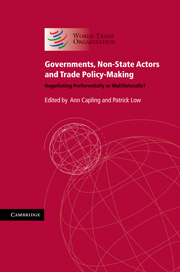Book contents
- Frontmatter
- Contents
- List of figures and tables
- List of contributors
- Acknowledgements
- Disclaimer
- Introduction
- 1 The domestic politics of trade policy-making: state and non-state actor interactions and forum choice
- 2 Chile
- 3 Colombia
- 4 Mexico
- 5 Indonesia
- 6 Thailand
- 7 Jordan
- 8 Kenya
- 9 South Africa
- 10 The influence of international non-state actors in multilateral and preferential trade agreements: a question of forum shopping?
- 11 Main findings and conclusions
- Index
11 - Main findings and conclusions
Published online by Cambridge University Press: 05 July 2014
- Frontmatter
- Contents
- List of figures and tables
- List of contributors
- Acknowledgements
- Disclaimer
- Introduction
- 1 The domestic politics of trade policy-making: state and non-state actor interactions and forum choice
- 2 Chile
- 3 Colombia
- 4 Mexico
- 5 Indonesia
- 6 Thailand
- 7 Jordan
- 8 Kenya
- 9 South Africa
- 10 The influence of international non-state actors in multilateral and preferential trade agreements: a question of forum shopping?
- 11 Main findings and conclusions
- Index
Summary
Introduction
One of the most pressing issues confronting the multilateral trade system today is the rapid proliferation of preferential trade agreements (PTAs). Much has been written about why governments might choose to negotiate preferentially or multilaterally, but this literature has been written almost exclusively from the perspective of governments. We know very little about how non-state actors (NSAs) view the issue of forum choice, or how they position themselves to influence choices by governments about whether to emphasize PTAs or the World Trade Organization (WTO). The case studies in this book have sought to address these issues through interviews with state and non-state actors involved in trade policy-making in eight countries.
This chapter briefly summarizes the main findings from the case studies and distils a set of conclusions that we consider to be of general applicability. This summary does poor justice to the wealth of analysis and detail contained in the individual case studies, and thus it is very far from being a substitute for reading the individual studies. Nonetheless, some clear patterns have emerged from the case studies which allow us to make some more general observations about trade policy-making and forum choice. We have divided the main findings into three sections, each dealing with a particular aspect of the domestic trade policy-making process. Section 2 concerns the way governments organize themselves and fashion national priorities when formulating trade policy. Section 3 focuses on mechanisms that governments use for consulting with NSAs and the attitudes underlying this interaction. Section 4 deals with NSAs themselves and how they perceive their interests and go about their business. In discussing these various aspects of domestic policy-making, we shall draw illustratively but not exhaustively from the case studies. Section 5 contains the conclusions.
- Type
- Chapter
- Information
- Governments, Non-State Actors and Trade Policy-MakingNegotiating Preferentially or Multilaterally?, pp. 311 - 332Publisher: Cambridge University PressPrint publication year: 2010



